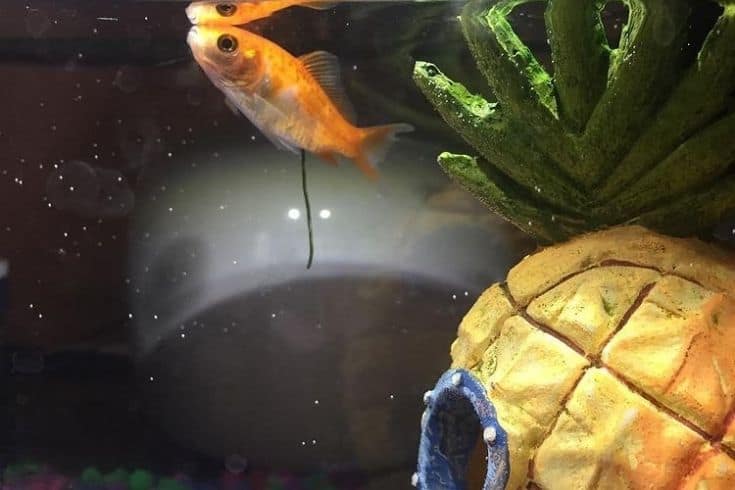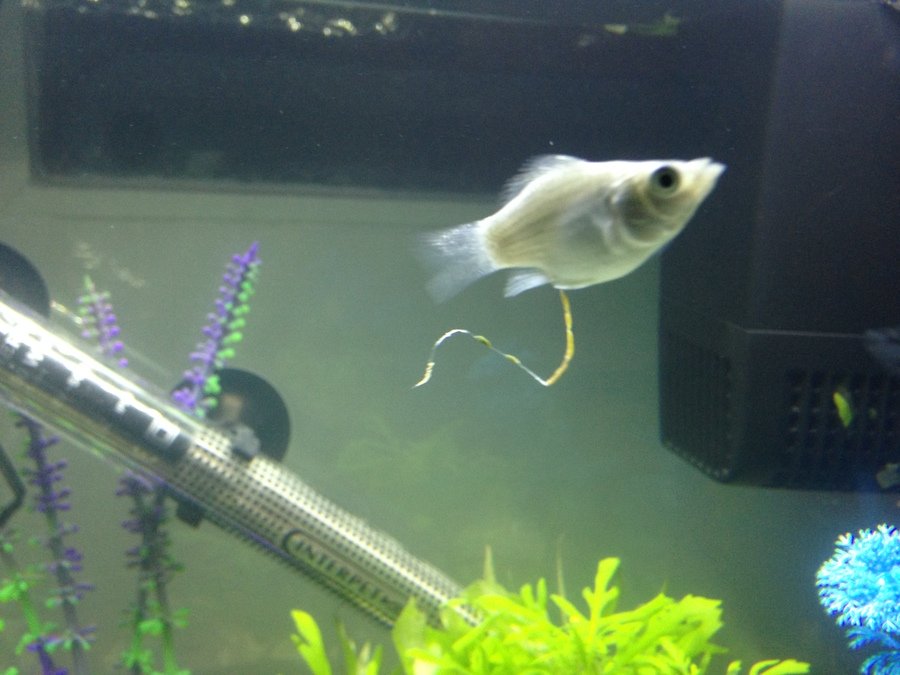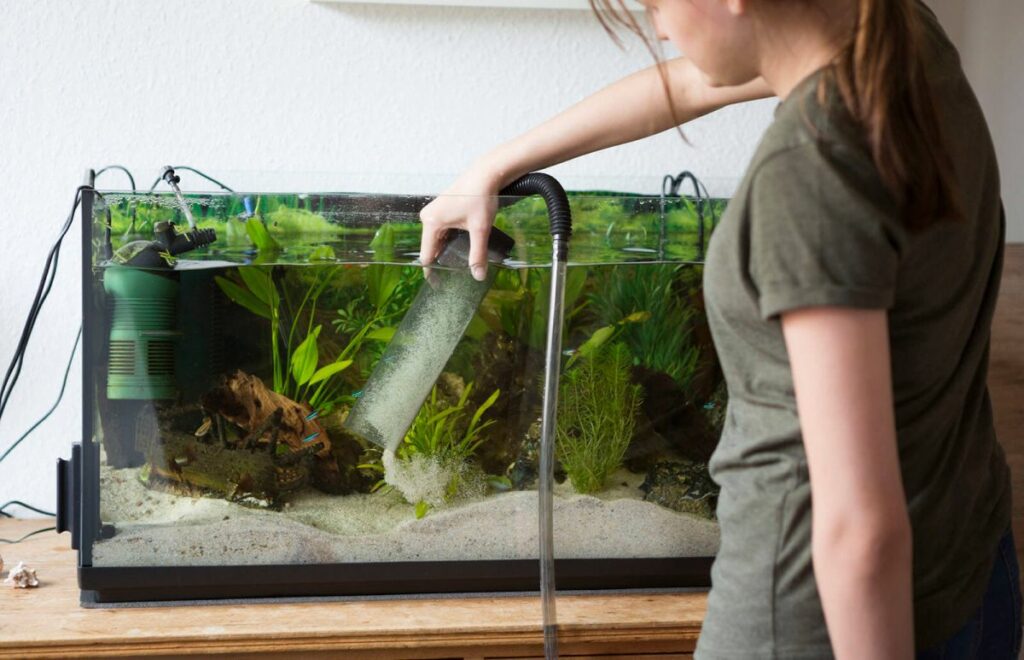Are you wondering, can fish poop? Yes, fish poop just like any other pet you bring into your home.

Fish poop is an inevitable part of fish keeping, but it’s easy to clean up. With a good gravel filter, you’ll get rid of fish poop in no time, and your fish will have a beautiful, healthy tank.
Fish poop like any other vertebrate, but how they process urine is quite different. Plus, there are some fish that poop sand to create beautiful beaches.
Do Fish Poop?
A fish poops just like every other animal. They eat food, so ridding their body of waste is necessary.
How Do Fish Poop & Urinate?
You’re probably wondering, where do fish poop from? How do they produce urine?
Urination
Like other vertebrates, fish produce waste in the kidneys. But, they also process waste through their skin, and even their gills which release waste as ammonia.
Because they live in water, fish have trouble maintaining the water-to-salt ratio in their body. The amount of salt and water coming and going from their body needs to be in harmony or they will die.
The way they regulate these ratios depends largely on the excretory system. Water constantly diffuses across the skin membrane and through the gills. Mucus on the fish’s body slows diffusion, but is not enough to stop it completely.
The amount of salt in the urine varies depending on if the fish is a freshwater or saltwater fish.
Saltwater Fish
Salt surrounds saltwater fish, so their bodies need to get rid of the extra salt their body is absorbing, or they can become dehydrated. So, when they produce urine, it is heavily salt concentrated.
Freshwater Fish
The opposite is true for freshwater fish; they need to maintain the salt levels in their body to survive because there’s not enough in the surrounding water. They produce dilute urine containing low levels of salt and high levels of water.
Freshwater fish usually have larger kidneys than marine fishes because their urine contains more water.
Gills & Salt Concentration
Gills also play a part in managing how much salt is in a fish’s body. Britannica describes this process:
“The gills and skin inside the mouth actively absorb salt from water passed through the mouth. This absorption is performed by special cells capable of moving salts against the diffusion gradient. Freshwater fishes drink very little water and take in little water with their food.
Marine fishes must conserve water, and therefore their kidneys excrete little water. To maintain their water balance, marine fishes drink large quantities of seawater, retaining most of the water and excreting the salt.”
Defecation
Like other vertebrates, fish have a digestive system that absorbs the nutrients from the food they eat. The food passes through the stomach and intestines, and passes out through the anus.
How Often Do Fish Produce Waste?
Fish have kidneys, but their kidneys operate much slower than mammals. While most mammals urinate every few hours, fish only poop and pee once a day. Both waste products come out of an orifice on the underside of the fish, near the tail.
Pooping occurs less than peeing, only once every 48 hours.
What Does Fish Poop Look Like?
Normal fish poop is brown and looks like a pellet. Poop that isn’t brown isn’t necessarily a bad thing, it just depends on what your fish has eaten. A fish that eats lots of algae may have green poop. A fish that eats lots of bloodworms may have poop with a reddish tint.
Sometimes, you’ll notice a fish poop string hanging from their anus.
Brown, stringy fish poop hanging from your fish’s anus shows they are expelling large amounts of waste at once. This is usually a sign you are feeding them too much, too often, or they are not receiving the right nutrition. Freshwater fish do not deal with constipation, but you shouldn’t overfeed them, either.
What If The Fish Poop Is White?

White or yellow stringy poop shows your fish is not expelling poop at all, only mucus. Mucus lines your fish’s intestines to help move the poop along.
If your fish is not expelling any poop, it means they haven’t eaten. Because you only feed fish once or twice a day, this is normal, and is not usually cause for concern.
White poop may be a sign of a parasite, but unless you’re keeping your fish in unhealthy conditions, this is unlikely. Check if the poop appears to be moving, and if it’s not, it’s probably not a parasite.
The Importance Of Cleaning Fish Poop

It is essential to clean your tank to get rid of the poop. Fish can get sick if there’s too much poop in the tank because it causes ammonia build-up.
It’s easy to clean poop from your fish tank because it settles to the bottom of the tank where you can suck it up with a gravel vacuum. If you’re worried your tank has too much flow and the poop is floating everywhere, just turn off the filter and pumps while you’re cleaning.
How To Clean Fish Poop From Sand
Cleaning poop from sand is as easy as cleaning it from gravel. The poop sits on top of the sand, so you can suck it up with a gravel vacuum.
With gravel, you can stick the vacuum in the rocks and shake it around to dislodge waste. You can’t do this with sand or you’ll suck up the sand.
Instead, keep the opening of the gravel vacuum about an inch or two away from the surface of the sand. You will suck up the waste, but leave the sand behind.
Another option is to use a manual strainer to clean the poop from the sand.
Is Sand Fish Poop?
Have you ever heard of fish pooping sand? Is there any truth behind the claim?
Some sand does come from fish poop, but most sand is finely broken-up particles of minerals.
The parrot fish is a fish that poops sand, creating the beautiful white beaches of Hawaii. Parrot fish eat algae from rocks along with dead coral. As their name suggests, they have hard beaks which they use to scrape off the algae and grind up the hard coral material.
The calcium-carbonate in coral is inedible, so it passes through their digestive tract and comes out as sand.
Every year, parrot fish poop provides Hawaii’s beaches with hundreds of pounds of new sand.
Is Fish Poop Good For Plants?
Fish poop fertilizer is excellent for plants. Many fish keepers who own plants water their plants with their dirty tank water.
Fish poop contains phosphorus and nitrogen, which are excellent for plant growth. Most people who use fish tank water for their plants notice their plants grow bigger and healthier.
The same is true for aquatic plants, but this doesn’t mean you shouldn’t clean your tank. Too much fish poop can be detrimental to your aquatic plant’s health, and may leave you with a tank full of algae.
Researchers have even discovered a way to sustainably grow vegetables and farm fish at the same time. An aquaponics system uses fish poop to help the vegetables grow.
Oregon State University describes how this works:
“Fish are typically raised in indoor tanks, troughs or outdoor ponds, where they produce excrement. The water with the waste from the tank flows to a hydroponics tray where plants grow in the water without soil. The waste is toxic to the fish but is a rich fertilizer for the plants. As the plants absorb the nutrients, the water is purified for the fish. The clean water can then be recycled to the fish tank.”
Conclusion
Parrot fish poop white sand because they eat hard bits of coral their body can’t digest. But, most fish poop normally like any other vertebrate. It’s easy and essential to clean the poop from your fish tank to keep your pets healthy. If you have plants around the house, you can even save the old, dirty water to fertilize your plants.
FAQs
Most animals won’t eat poop unless there is a lack of food in the aquarium and they are starving. Fish poop doesn’t contain the nutrients they need to stay healthy, so there’s no advantage to eating it.
Goldfish seem to be one exception that likes to eat poop. They likely do this because they are constantly hungry and eating, but the poop doesn’t provide any nutritional value.
Like other fish, bettas usually poop about once a day. Sometimes, they may poop up to 5-6 times a day.
